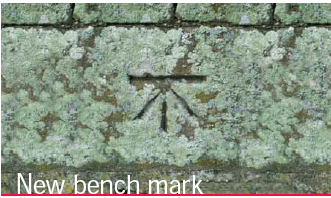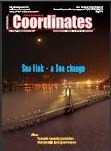November 2009
INCA 2009
25-27 November
Kolkata, India
http://www.incaindia.org
ISPRS (Geospatial Data Cyber Infrastructure)
25-27 November
Hyderabad, India
http://www.incois.gov.in/isprs

First Galileo satellite repositioned
Surrey Satellite Technology (SSTL), UK, has completed the repositioning of the first Galileo test satellite, GIOVE-A, to a higher orbit to make way for the operational satellites of Europe’s satellite navigation constellation. From the GIOVE-A operational headquarters, the operating team executed a series of precisely planned manoeuvres during July and August that have repositioned the satellite 113km above the orbit that the 27 operational Galileo navigation satellites will occupy. www.sstl.co.uk

ISRO’s Desk
India to launch satellites to study climate change
India shall soon be launching two dedicated satellites in polar orbit to study climate change through atmospheric research and detection of greenhouse gases. It will make India one of the few countries in the world to have such advanced facility to study the impact of climate change due to emission of greenhouse gases. www.thaindian.com

Digital village in China
A two-year project to bridge the urbanrural digital divide in Yunnan Province in southern China is gathering pace. US$18 million so far has been spent in the creation of the ‘Yunnan Digital Village’, which will bring information technology to 16 cities, 129 counties and 130,000 villages in the province. The initiative was devised by Intel, which provided consulting services as well as technology and engineering solutions. http://chinadigitaltimes.net

GPS IC shipments forecast for 2010
According to ABI research GPS IC shipment growth should see a 30% increase. The unabated interest in GPS-enabled smartphones during the recession has been a life-saver for the GPS IC industry, and future growth will be fuelled by the integration of GPS in feature phones across Europe and Asia. www.abiresearch.com

Integration of GPS Flight Tracking into Aviation Management SaaS
Trindigo has integrated Blue Sky Network’s GPS tracking and automated flight following technology into Blue Sky aviation management suite. It will enable continuous monitoring location of flights within Trindigo’s web-based solution using Blue Sky’s near real-time GPS data. www.blueskynetwork.com

ikeGPS™ powered by u-blox
u-blox and Surveylab has unveiled the successful integration of u-blox’ LEA GPS receiver module into Surveylab’s ikeGPS remote data capture products. It is a combination of positioning technology from u-blox with a 3D compass, laser rangefinder and digital camera. www.u-blox.com

The damage caused by Hurricane Katrina to the southern United States has exploded the myth that natural disasters happen only to poor countries. Yet there is a grain of truth in the myth. Natural disasters happen all over the world, but the extent of damage and loss of life has far more to do with the preparedness and responsiveness of the relevant human systems, not only where the disaster happens but also often half-way across the world.











 (5.00 out of 5)
(5.00 out of 5)